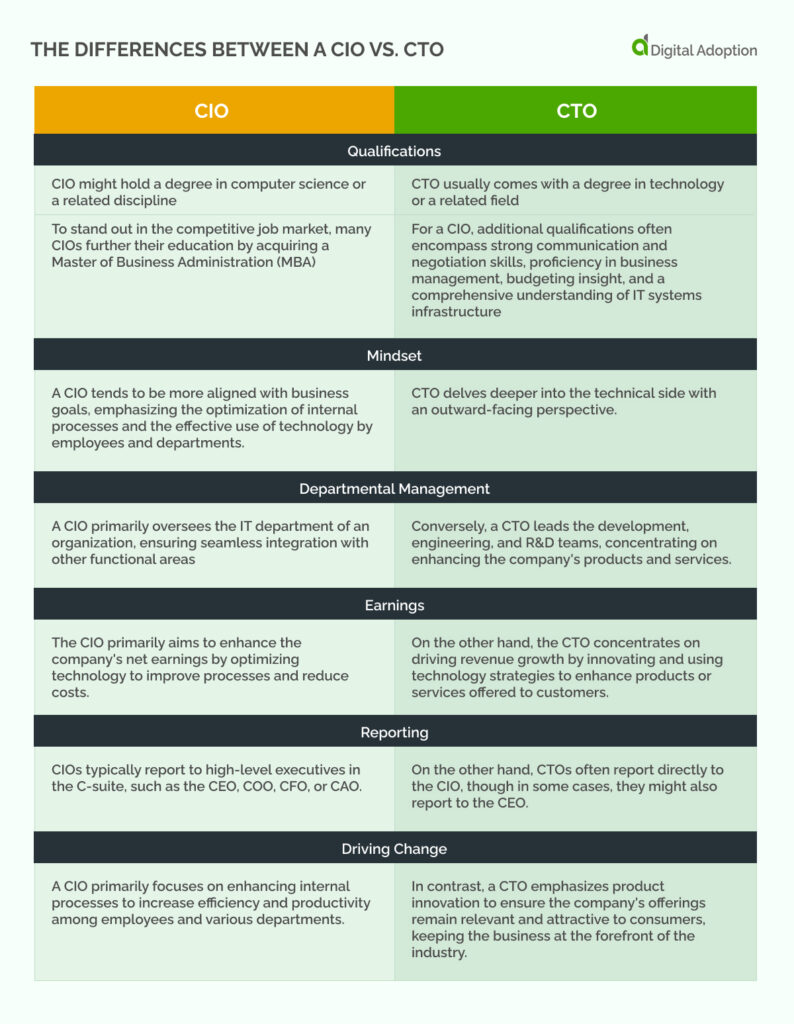A CIO is an individual who is primarily tasked with guiding a company’s overall approach to its internal IT operations and infrastructure, and a CTO’s role centers on creating technology products tailored to customer requirements, necessitating regular technological research to enhance the company’s offerings.
While both roles are pivotal, they have distinct areas of focus. A CIO aims to curtail IT expenditures, ensure maximum efficiency and compliance, and optimize productivity. Their goal is often to streamline and automate business processes, harnessing the best mix of technology platforms and applications to provide valuable analytics and insights.
Check out our ultimate C-Suite Guide: CEO vs. CIO vs. COO vs. Other Executives for a comprehensive overview.
Conversely, CTOs look outward, tapping into emerging technologies to foster business expansion. From a management perspective, CIOs must craft strategies to guide tech teams in product design, development, and evaluation.
CIO and CTO roles are tech-centric, but their objectives can sometimes conflict. A CIO’s budgetary focus might impede an organization’s tech modernization efforts.
Simultaneously, a CTO’s drive to provide stellar customer experience transformation and scale opportunities may demand significant investments without immediate returns.
By the end of this article, you will understand:
- What a CIO and a CTO, as well as their roles and responsibilities
- The main differences between these two types of technology-focused roles
- Why a business needs both a CIO and a CTO
- Similarities between a CIO and a CTO
- The career paths, job descriptions, salary ranges, and interview questions a CIO or a CTO applying for a job will come across.
- How a CIO and CTO can work with each other
- The future of the CIO vs. CTO debate
What Is A CIO?
A Chief Information Officer (CIO) oversees the flow and management of information within an organization.
Their primary goal is to manage technology to ensure smooth and efficient business operations, often zooming into specific teams’ and individuals’ performance and productivity. Central to their role is overseeing the organization’s technological infrastructure and security, safeguarding the company’s data and sensitive information.
Roles And Responsibilities Of A CIO
A CIO, or Chief Information Officer, is one of the key positions in an organization responsible for managing and implementing information technology strategies.
They work closely with other C-level executives in this role to align technology with business goals and objectives.
Some CIO responsibilities include:
- Overseeing the organization’s technological framework.
- Collaborating with vendors and ISPs to enhance operational efficiency.
- Leading and coordinating with IT professionals, in-house technical teams, and operations staff.
- Handling external vendor relationships.
- Evaluating the technological needs of various teams and individuals.
- Implementing tech solutions to optimize workflows.
- Keeping abreast of the latest technological advancements.
- Engaging in negotiations with suppliers, collaborators, and industry specialists.
What Is A CTO?
A CTO leverages technology to enhance the company’s profitability.
Instead of centering on internal stakeholders, they focus on external audiences. This might involve engaging with customers or conducting focus groups to gauge the target market’s requirements.
Moreover, a CTO works closely with the organization’s technology team, ensuring that any technological updates or improvements resonate with the preferences and needs of both current and prospective customers.
Roles And Responsibilities Of A CTO
The core responsibilities of a CTO include:
- Supervising the company’s technological products and services.
- Crafting strategies that drive business strategy through technology.
- Collaborating with vendors to devise optimal solutions.
- Evaluating and implementing specialized tools and products.
- Ensuring that product architectures align with the company’s objectives.
- Leading the development and engineering departments.
- Establishing and overseeing IT budgets.
- Aiming to boost the company’s revenue through technological initiatives.
- Being aware of the latest trends and advancements in the tech industry.
Does A Business Need A CIO And A CTO?
The CIO and CTO roles uniquely contribute to the company’s overall health— the CIO by optimizing processes and costs internally and the CTO by driving external revenue through technological advancements.
In addition, CIO and CTO positions are crucial in large organizations that maintain a defined C-suite structure.
The Differences Between A CIO vs. CTO

While both positions navigate the realms of technology, data management, and information, the distinctions between a CIO and a CTO can be outlined as follows:
Qualifications
The educational backgrounds of CIOs and CTOs, as well as their areas of expertise, can vary. Typically, a CIO might hold a degree in computer science or a related discipline.
However, to stand out in the competitive job market, many CIOs further their education by acquiring a Master of Business Administration (MBA).
On the other hand, a CTO usually comes with a degree in technology or a related field. Like their CIO counterparts, many CTOs value an MBA to enhance their business acumen.
For a CIO, additional qualifications often encompass strong communication and negotiation skills, proficiency in business management, budgeting insight, and a comprehensive understanding of IT systems infrastructure.
Mindset
The primary focus areas of a CIO and CTO differ significantly. A CIO tends to be more aligned with business goals, emphasizing the optimization of internal processes and the effective use of technology by employees and departments.
On the other hand, a CTO delves deeper into the technical side with an outward-facing perspective. They frequently engage with external stakeholders like customers and vendors to ensure the company’s tech offerings remain cutting-edge and meet market needs.
Departmental Management
A CIO primarily oversees the IT department of an organization, ensuring seamless integration with other functional areas. Conversely, a CTO leads the development, engineering, and R&D teams, concentrating on enhancing the company’s products and services.
Earnings
The CIO primarily aims to enhance the company’s net earnings by optimizing technology to improve processes and reduce costs. On the other hand, the CTO concentrates on driving revenue growth by innovating and using technology strategies to enhance products or services offered to customers.
Reporting
CIOs typically report to high-level executives in the C-suite, such as the CEO, COO, CFO, or CAO. On the other hand, CTOs often report directly to the CIO, though in some cases, they might also report to the CEO.
Driving Change
CTOs and CIOs are pivotal in driving organizational change, albeit through different approaches. A CIO primarily focuses on enhancing internal processes to increase efficiency and productivity among employees and various departments.
In contrast, a CTO emphasizes product innovation to ensure the company’s offerings remain relevant and attractive to consumers, keeping the business at the forefront of the industry.
CIO vs. CTO Similarities
CIOs and CTOs enhance a company’s operations to boost profits and revenue.
Collaborating closely, their successes often complement and reinforce one another. While each oversees distinct departments, they aim to merge their respective domains to optimize processes for customers and internal teams. Therefore, many businesses find it beneficial to have both roles on board.
Collaboration Between The CIO And CTO
Inherent tensions often arise between CIOs and CTOs due to overlapping responsibilities.
For instance, initiatives spearheaded by a CIO that alter internal tech systems might inadvertently affect the customer experience or service quality. Take the adjustments to a CRM system as an example.
Conversely, a CTO could champion a technology that shifts the service paradigm for specific customer groups, complicating IT service delivery or introducing new capability demands, such as incorporating DevOps or reconfiguring system connections.
Resolving the key differences in approach between CIOs and CTOs is crucial and might require a rethink of their responsibilities.
Real success hinges on fostering close collaboration between the two roles.
It’s vital to establish forums that center on critical areas of overlap, like shared systems or resources, and that promote openness, transparency, and a problem-solving attitude.
This ensures both parties are informed about impending changes and can align every decision and action with the broader strategic goals of the enterprise.
CIO Career Path
Before stepping into the role of a CIO, many individuals typically spend several years in the IT sector. A significant portion of the CIO’s role revolves around technological solutions utilized within a company, so having an IT background is often seen as essential.
Besides their technical knowledge and skills, a CIO should be adept in marketing and possess good communication skills. They should excel in conveying their thoughts, steering teams, and pinpointing opportunities for process enhancement.
Most CIOs possess a bachelor’s degree in IT or a related field. Those aspiring for this senior position often further their education by pursuing a master’s degree in IT, business, or another relevant discipline.
CIO Interview Questions
During the interview process for a CIO position, you must look for candidates who can inspire and adeptly lead on a digital transformation strategy and achieve set objectives in line with the organization’s goals.

Some of the operational and situational interview questions that you can ask a potential CIO include:
- How would you advocate for the advantages of a novel IT system to the CFO?
- Faced with substantially reducing the IT department’s budget, which areas would you underscore to balance efficiency and impact?
- What counsel would you offer to an IT team rookie?
- How would you navigate entrenched mindsets resistant to change?
The interview could also be made up of these CIO behavioral questions:
- Were there instances where you navigated through unwarranted IT demands from senior management? What was your strategy?
- Narrate an episode where you championed a business challenge through the lens of a fresh IT system. How did you rally the C-suite around your proposal?
- Can you pinpoint a time when your long-haul IT stratagem bore fruit? Who were your collaborators, and what ripple effect did it create on the organizational fabric?
- Which platforms or avenues do you rely on to keep up-to-date with tech evolutions? Is competitor monitoring part of your repertoire?
- Can you walk us through a security hiccup from a past tenure? What was your response strategy?
- Reflect on a project under your helm that didn’t reach its destination. What transpired, and what pearls of wisdom did you glean from the ordeal?
CIO Average Salary

The annual remuneration for these two positions fluctuates based on different data sources.
While Salary.com states that the salary for a CIO is $325,100, Glassdoor highlights that the salary for a CIO is $327,475 as of September 2023. This means that the average salary for a CIO is $ 326,287.5.
CTO Career Path
To progress to a CTO role, you need to start with specific academic prerequisites that are typically necessary, including a bachelor’s degree in computer science or a comparable domain.
Given the surge in cybersecurity threats, numerous educational institutions have augmented their curricula to include specialized security and data defense programs, making it a potential focus for ambitious CTOs.
Many begin their journey in engineering roles or research and development within tech enterprises. Real-world experience often equips them with invaluable insights and expertise crucial for senior positions.
CTO Interview Questions
When interviewing potential CTOs, it’s essential to identify those with a robust technical foundation and the strategic foresight to align business strategy with technological advancements.
In addition, your ideal CTO should be an eloquent communicator capable of elucidating complex technical concepts to varied audiences. Furthermore, their leadership acumen should shine through, illustrating their capability to inspire and guide diverse teams.
Let’s delve into the interview questions for a potential CTO, categorized for clarity:
Operational and Situational Questions:
- How would you modernize our current communication infrastructure?
- How would you address a noticeable dip in a team member’s performance?
- How would you structure a company-wide Internet usage policy?
- Upon joining, what aspects of our existing systems would you prioritize for review?
- With limited resources, would you prioritize optimizing existing systems or exploring novel technologies? Why?
Behavioral Questions:
- Share an instance where you mediated team conflicts. What strategies did you employ?
- Reflecting on your career, what achievement stands out the most? What makes it significant?
- Describe a challenging project that you spearheaded. What were the hurdles, and how did you navigate them?
- How do you stay updated with the ever-evolving tech landscape?
- During high-pressure situations, how do you keep your team motivated and focused?
- Can you recount a time when you had to make a difficult decision that wasn’t popular but was necessary for the greater good? How did you handle the aftermath?
CTO Average Salary
The annual compensation for the CTO role depends on the source you look at.
While Salary.com states that the typical salary for a CTO is $325,100, Glassdoor has a higher rate for a CTO salary at $338,349 as of September 2023.
So the average salary for a CTO, when using these two sources, is $331724.5.
The Future Of CIOs And CTOs
The CIO role predominantly revolves around weaving together IT and overarching business strategies. They take charge of automation, modernization of processes, and steering data architecture.
On the other hand, the CTO excels at scouting and integrating emerging technologies into the business fabric. They keep a pulse on industry trends and benchmark potential technology initiatives against what their competitors are doing.
While the CIO primarily looks inward, aligning tech operations with business goals, the CTO is more external-facing, delving deep into technology, architecture, and product evolution.
The CIO lays out the vision, with the CTO partnering to bring that vision to life. Their collaboration is most evident in technology strategy formulation, product mapping, and meeting client deliverables.
The surge in digital transformation further blurs the lines between these roles. For instance, external adoption of revolutionary technologies like IoT, cloud, and machine learning often necessitates internal integration to grasp their potential and challenges.
CIOs and CTOs are now tasked with future-proofing their organizations, ensuring adaptability and resilience against upcoming challenges. The CIO partnership will result in the ideal technological implementation process, leading to a higher ROI.
A clear grasp of the nuances between these roles will aid a company in making astute hiring decisions and aligning the right CIO and CTO leaders with the proper responsibilities.
Frequently Asked Questions
How Is A CTO Different From A CIO?
A CIO generally concentrates on technology management and internal operations, optimizing company processes. Meanwhile, a CTO directs their attention externally, leveraging technology to innovate or enhance products for customers.
Can a CIO Be A CTO?
In specific organizations, the role of the CIO encompasses the duties of the CTO. However, the required experience and skillset differ depending on the role, so it is up to a company whether they want to hire the same person for both roles.













